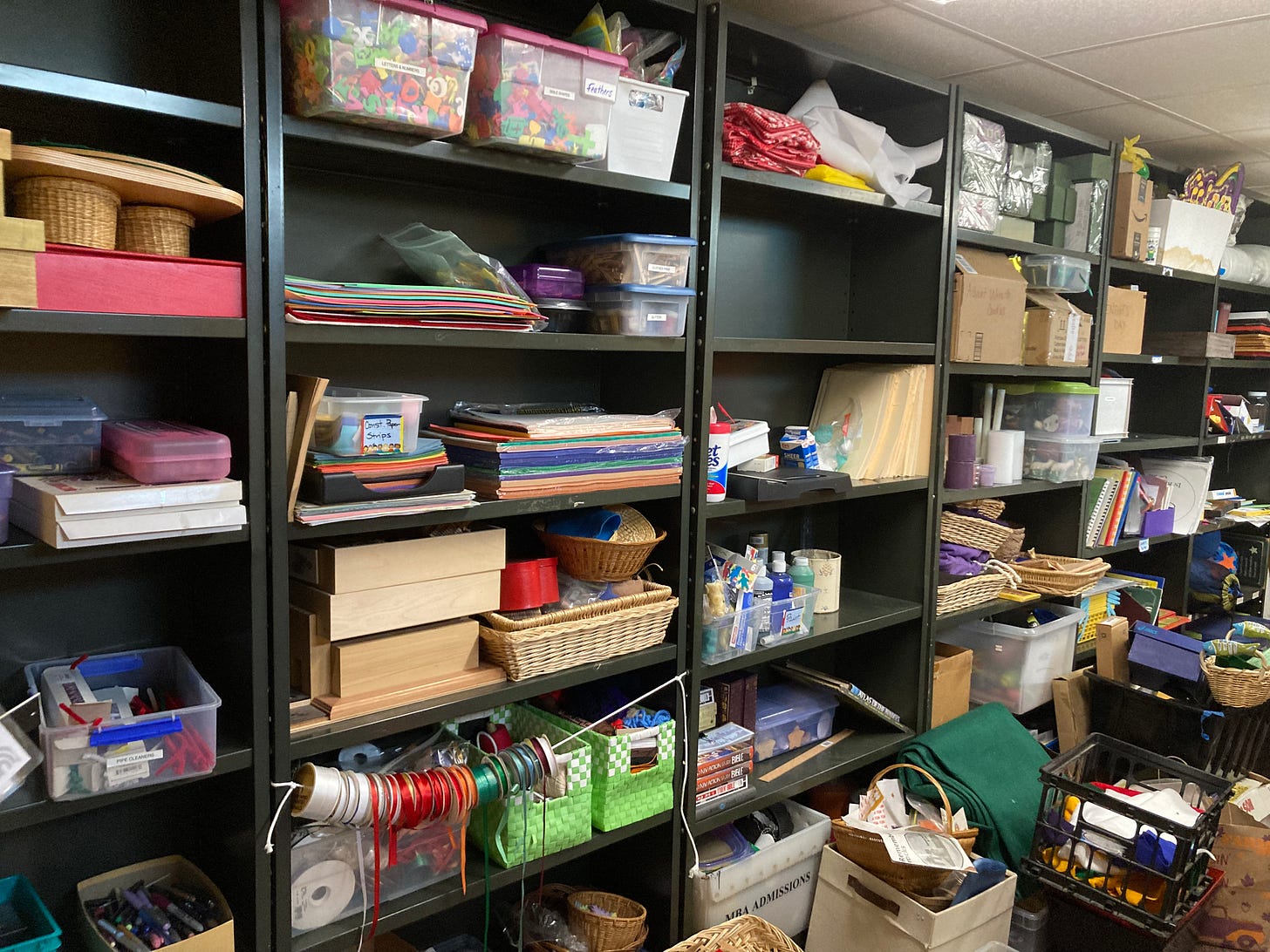Dear Friends,
This week, I was tasked with one of my favorite things: going through books from my parish’s library.
This has always been one of my favorite activities. I grew up as a library kid, visiting several times a week with my grandmother. I love organizing my own books, going to book sales, collecting books, you name it. And, when I work – either in my own parish or as a consultant – weeding through children’s books is one of my top priorities because those books clearly communicate theological and social commitments.
As I weeded through the various books that had been set aside for me, I found a number of the usual suspects: children’s Bibles and prayer books, a small teacher gift book, those strange books about church school and Bible stories that people sometimes write but which don’t seem to have a particular purpose (“Does God Have a Big Toe?” - what am I supposed to do with that?!). And then I found “801 Questions Kids Ask About God.”
Now, I’ve been teaching in church schools for a long time. I have been asked A LOT of questions. Maybe even 801 questions (beyond why/what does your tattoo say/etc.). But let me tell you, I haven’t been asked the majority of questions in this book – and the majority of the questions in that book weren’t really about God.
That’s because “801 Questions Kids Ask About God” is a “desk reference” put out by Focus on the Family. The questions, then, are primarily about explaining the Christian Nationalist-Purity Culture worldview of the audience’s family, not the loving nature of God.
It seems fitting that I pulled that book out this week because the first question I opened that book to – out of morbid curiosity – was “Why do people worship idols?”
Now, maybe some child might ask that question following a lesson on the Ten Commandments, which we encounter in our lectionary this week. But it’s not the question that usually arises in any context I’ve worked in, for a few reasons.
First: to ask that question, children need to have been introduced to the idea of idols in greater depth. There needs to be a sense of what that means in the modern world and, realistically, that’s not one of the commandments that’s especially important to me to teach about to young children. That’s a commandment I don’t feel strongly about grappling with until at least about middle school.
Second: the children have more pressing concerns, concerns about commandments that impact their own lives. Depending on how it’s phrased, they are concerned by the prohibition on adultery, which we typically phrase in Godly Play as “Do not break your family,” language that can suggest that divorce is forbidden. Language about coveting and jealousy can also be a point of attention. The commandment against idolatry just isn’t one of their priorities.
Feel free to tell me I’m wrong. Maybe your eight year olds really want to ask about idolatry and are convinced there’s a lot of idol worship in this world (there are and Focus On The Family isn’t entirely wrong about some of them, I’ll be honest), but it’s not where the wondering leads my circles, typically, and I don’t remember it being a major concern when I was a child in church, either.
Knowing God, Knowing Love
One major conversation in the Christian Formation world is choosing educational resources that won’t result in a whole lot of unlearning down the line. We want to offer children a meaningful experience that is also “accurate.” We hope, as Meredith Miller describes it, to offer children a faith they don’t have to heal from.
Also, f you haven’t listened to her conversation on Everyday Godly Play’s “Mess Makes Meaning” podcast, you’re missing out!
Meredith also has her own podcast on talking about Bible stories with elementary-age children:
So, how are we offering children that kind of healthy, authentic faith experience?
Have you weeded your parish children’s library?
Those questions are not unrelated. Inside old materials, children bump into simple, straightforward messages about God that may not be what you hope to teach. Maybe it’s because of the illustrations, where God is an old white man in the sky. Maybe it’s the simple, stark text - I pulled a book out of a friend’s library that included text about how everyone deserved to be punished for Adam and Eve’s sinfulness. I spend a lot of time reviewing children’s books for a reason. With a few words, with simple illustrations, they can do a lot of good or a lot of harm.
Next month, members of my Province’s formation ministries will come together for our annual gathering, and our theme is Reduce, Reuse, Recycle. It’s a powerful theme for the formation world because if you’ve spent any time pondering the contents of your program’s supply closet, you’ve surely found yourself trying to figure out what to do with old material
I collect some of the old materials I salvage in the course of my work, things I would never use but which tell me something about the greater historic arc of this field. How were prior generations of children shaped in these classrooms? What were they told about God, in words and in images and through other materials? How do these materials help them to know God and God’s love?
Resources & Housekeeping
What’s up over here in Wiggles & Wonder? A few notes –
I love writing this newsletter, and I’d love to expand what I do here. And so, I ask:
(I can only include a certain number of options here, but if there’s something you’ve ever thought “I wish Bird would…," email me!)
Don’t forget that you can find my writing elsewhere. I was over at GrowChristians yesterday writing about Photini, the Samaritan Woman at the Well. I really enjoyed writing this particular piece and I hope it offers a valuable reminder around how we read “unnamed” figures in the Bible.
Are you familiar with Traci Smith’s Faithful Families books? If so, you know what a valuable resource they are – and there are supplemental resources in development. I encourage anyone working in a parish context to take this survey affiliated with the project.
In a similar vein, the Godly Play Foundation is doing some discernment for a new grant, and has put out a survey regarding how the organization can support parishes in their liturgical and prayer lives. You can provide feedback here (and you’ll get a coupon for the Godly Play Resources store).
We’re getting another module of Holy Troublemakers curriculum materials! And if you want to learn more about how to use those resources, Holy Troublemakers author Daneen Akers and curriculum author (and my mentor/friend/colleague) Wendy Claire Barrie are offering a workshop on progressive formation practices through the Yale Divinity Institute. You can register here.
This week, let me leave you with this new track from The Porter’s Gate (I recently learned I’m one degree of separation from this group, which I love) -
Peace,
Bird






